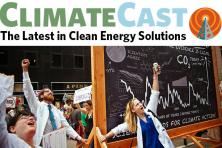Despite releasing climate plans, candidates spend less than 10 min debating climate
Democrats gathered in Miami for the first presidential debate last month, against a backdrop of climate consequences including an unprecedented 17,000-acre fire in the Everglades (check out this video) and flooded streets due to sea level rise -compromising septic tanks and threatening water supplies. Still, moderators and candidates spent less than ten minutes of debate time on climate change impacts or how to address the crisis. Even this meager exposure was more airtime than the topic received during all 2016 presidential debates. The Democratic National Committee continues to deny a debate solely focused on climate change, but with ongoing grassroots pressure and nearly all Democratic candidates backing the concept, that could change. Political underexposure of climate topics is not limited to the Democratic debates; Trump’s recent 45-minute speech on the environment did not mention climate change.
States still accelerating into 100% renewable reality
States continue to make headlines for strong policy actions to transition to a clean energy economy. Oregon is accelerating adoption of electric vehicles, with the goal of having nine out of 10 new car sales be electric by 2035. Three new laws in Maine will accelerate the use of clean energy in the state: one that increases solar incentives; another that ups the state’s renewable portfolio standard; and one commissioning a Maine Climate Council, which will create a Climate Action Plan for the state. Meanwhile, Los Angeles is in the midst of finalizing a world record-setting power purchase agreement for solar and storage. The purchase will help the Los Angeles Department of Water and Power reach its goal of generating all power from carbon-free resources by 2050. In Dalton, Georgia, the City once known as “the carpet capital of the world” for its vast carpet manufacturing plants, has garnered a new title for its manufacturing expertise: home of the largest solar assembly plant in the Western Hemisphere. The Dalton plant employs 600 local workers.
Transitioning to a low-carbon economy will not be easy or inexpensive (one recent estimate places the cost of a 10-year nationwide shift to 100$ clean energy at more than $4.5 trillion) but states aware of the sure costs of climate inaction continue to demonstrate a willingness to move forward.
Climate emergency: time to stop making things worse
A growing number of local governments and private companies are treating climate change as an emergency that impacts profits and bottom lines. Chubbs Insurance just became the first major U.S. insurer to end coverage for coal plants and companies with significant revenues tied to coal production. In Washington State, the Port of Vancouver recently banned new bulk fossil fuel terminals on port-owned industrial property. And New York City now becomes the largest city in the U.S. to declare a climate emergency. Experts say that the state’s resolution, while largely symbolic, will help bolster legislation to cut local emissions. Earlier this month the U.S. Conference of Mayors, which includes leaders of U.S. cities with populations of 30,000 or more, called on Congress to pass carbon pricing legislation. They also voted to oppose any congressional action that would limit cities' abilities to sue fossil fuel companies for damage linked to climate change. Outside the U.S., Paris just enacted the most restrictive traffic measure in Europe by banning a third of the region’s cars from entering the capital on weekdays. Vehicles who violate the measure will be fined. This effort comes after a new report showed Paris to have higher air pollution than any other European capital.
Record-shattering temperatures in Alaska: A not-normal 90
Anchorage, Alaska reached a sweltering 90 degrees for the first time in the state’s recorded history. The state is already battling several severe wildfires and dealing with dense smoke advisories, which prompted the state fire marshal's office to issue a statewide ban on the sale and use of fireworks for Fourth of July festivities. Europe is still reeling from its June heatwave, where temperatures rose as high as 114 degrees in some parts of the continent. Scientists with the World Weather Attribution group said the heat wave was at least 5x more likely due to global warming, and that similar heat waves are 10x more likely to occur now.. As temperatures rise more households increasingly turn to air conditioning driving up energy use to keep cool.This begs the question: how will we effectively reduce emissions as the demand for carbon-intensive air conditioning continues to soar?
What really happened in Oregon?: A look at Clean Energy Jobs
Now that Oregon’s 80th legislative session has adjourned, journalists and other stakeholders are analyzing what went wrong with the state’s propsed cap-and-invest legislation. HB 2020. For some, the lesson was the need for campaign finance reform, since a small handful of highly-resourced opponents were able to kill a major Democratic priority in a state where Democrats control every branch of government. Oregon has some of the weakest campaign finance laws in the nation, and Oregon lawmakers have received hundreds of thousands of dollars in campaign contributions from the polluters they were working to regulate through the bill. While the bill did not move forward this session, the concept remains alive, wiith Governor Kate Brown suggesting that she would consider using executive power to enact the cap-and-invest program. Climate Solutions’ comments on HB2020’s fate is here; also see our overall summary of Oregon’s 2019 legislative session.
In Brief: Algae Blooms Fed by Farm Flooding Add to Midwest's Climate Woes
ClimateCast has already reported on the impacts to US farms and global food supplies from the Midwest’s torrential rain and flooding earlier this year. While the rain stopped and the flooding subsided, farmers are still dealing with their aftermath. Scientists now say that excess water flushed vast amounts of fertilizer and manure into waterways, triggering severe algae blooms. The National Oceanic and Atmospheric Administration even predicted that the "dead zone" in the Gulf of Mexico—a massive overgrowth of algae—could become the size of Massachusetts this summer. Meanwhile, as we go to press, many parts of the middle west and the Gulf states are facing down a new round of severely threatening weather.





